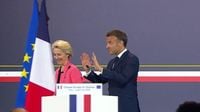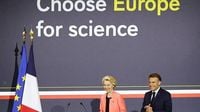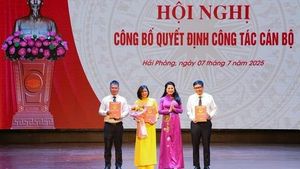On Monday, May 5, 2025, Ursula von der Leyen, President of the European Commission, and French President Emmanuel Macron launched the initiative "Choose Europe for Science" from the Sorbonne amphitheater, aimed at encouraging researchers and public and private entrepreneurs worldwide to choose Europe and France. The event attracted prominent figures in European research, including university presidents, research institute leaders, businesses, and political officials from across the continent.
The initiative's primary goal is to enhance the attractiveness of research in Europe and to continue attracting the best talent. Macron presented a vision where research serves as a lever for independence, competitiveness, and sovereignty, underlining the need for a free research policy, innovation, and investments to tackle upcoming scientific and technological challenges.
During the launch, Macron announced that 100 million euros will be allocated to finance the installation of foreign researchers in France. He emphasized, "Science does not need a passport, does not have a gender attribution, does not have an ethnicity." Ursula von der Leyen echoed this sentiment, stating that an envelope of 500 million euros will be allocated to make Europe a magnet for researchers. Additionally, she announced the creation of a "super scholarship" over seven years and the doubling of scholarships provided by Europe to researchers who settle on the continent.
Von der Leyen set an ambitious target for Europe, stating, "We want 3% of the European GDP to go to research by 2030." She emphasized the critical role of science in addressing major challenges such as health, climate change, and ocean preservation, declaring, "The science offers the key to our future in Europe. Without it, we cannot face the challenges ahead." She further noted that science should be shared by all humanity, highlighting its unifying power in a fragmented world.
Macron opened his remarks by referencing "Europe of freedom, prosperity, humanism, and knowledge," stressing that this is what is at stake today. He reflected on the context that led to the "Choose Europe for Science" initiative, lamenting the recent trends in one of the world’s largest democracies, which have seen research programs eliminated simply because they included the word "diversity." He stated, "No one could have imagined that one of the greatest democracies in the world would erase the capacity to issue visas for certain researchers, sometimes those who contributed to its own digital security."
Macron warned of a profound rupture in the current moment, stating, "Since the COVID-19 pandemic, we have been living in times where the unthinkable has succeeded each other; geopolitical rupture, economic rupture, and rupture of political markers." He emphasized the historical significance of the moment, recalling how Europe was built on a desire to understand the world, fostering free science and educating the best minds.
He reiterated, "Without free science, we lose the three pillars of our societies, which are the very heart of Western liberal democracies." He stressed the importance of truth in research, stating, "If we consider that truth is revealed, if we consider that there are forbidden researches, then we lose the ability to disagree together," echoing Voltaire’s sentiments.
The President noted, "There is no democracy that can last long without free and open science." He argued that academic freedom is essential for democracy as it separates truth from falsehood, allowing society to engage in meaningful debate. He warned against a potential future where distinguishing fact from fiction becomes impossible, which could lead to a breeding ground for conspiracy theories.
Macron also highlighted France's commitment to scientific competitiveness, recalling the "Make Our Planet Great Again" initiative launched in 2017, which attracted top researchers and continued essential programs that were threatened. He pointed out that since 2020, the bonuses for teacher-researchers and researchers have more than doubled, and by 2027, they will see an average increase of 6,000 to 8,000 euros annually compared to 2020.
Furthermore, Macron announced that by 2030, an additional 25 billion euros will be added to the research budget. He emphasized the need to secure databases and cooperative platforms to avoid dependency on private actors, stating, "We have made a profound mistake not to have a true European cloud. We must address this task as it is a necessity."
He also expressed the need for strategic autonomy in research and industry, insisting that Europe should not depend on the United States or China for critical technologies, including algorithms, space access, climate understanding, and semiconductors.
Macron outlined key areas for investment, referring to them as the "projects of the century," including health, infectious diseases, vaccine development, space exploration, quantum technology, artificial intelligence, and circular economy initiatives. He called for simplifying and accelerating the transition from fundamental research to applied research and industrial applications.
In closing, Macron issued an appeal from the Sorbonne to all free thinkers who wish to work for science and defend the European model. He urged them to choose a vision of society that emphasizes equality, the role of science, and fraternity among peoples to address the challenges of the century.





